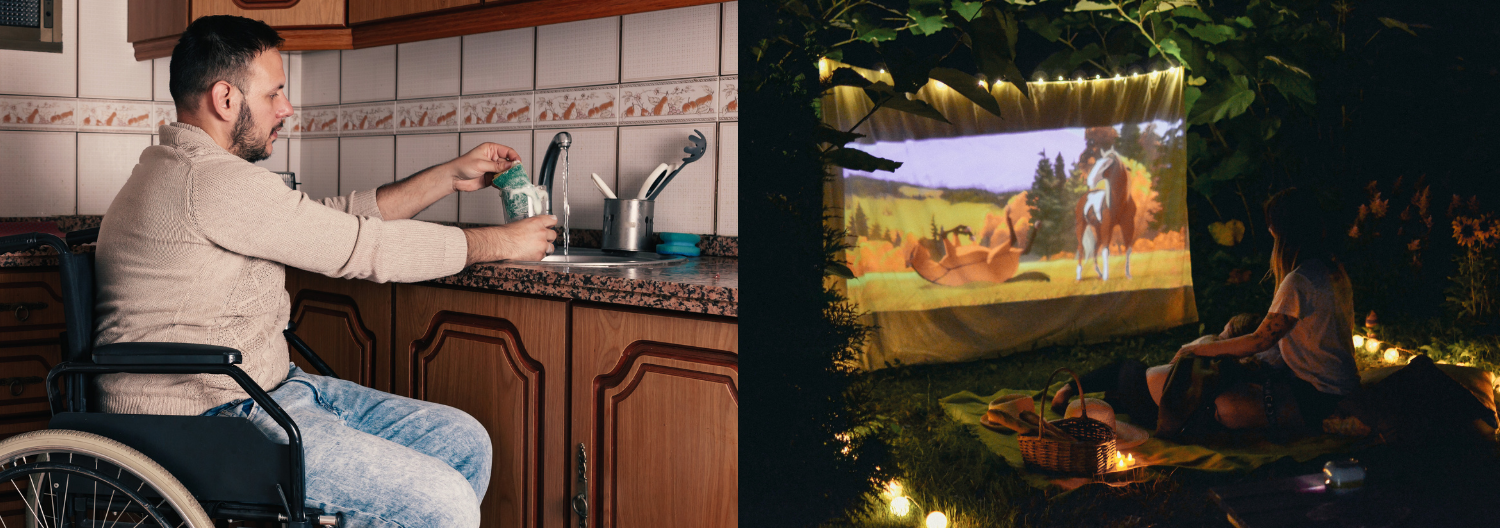Moving into your partner's home as an Autistic adult
by Kit Scott
Change is scary, right? Big life changes can feel really overwhelming for everyone, but especially so for Neurodivergent people. Many Autistic individuals rely on routine and predictability to feel safe in their everyday lives, and change can throw those routines into chaos, bringing spontaneous demands that are hard to prepare for. One big life shift? Moving in with your partner, especially if that means moving into their existing home.
Moving house is a big deal!
We lose our safe spaces, instead entering a new environment that might not yet feel like ‘home’. It can be overwhelming when…
We need to adapt to new sensory experiences
The new place sounds different, maybe the windows rattle a bit or there is a tree right outside.
This can mean that you might get a bit of sensory overload that you aren’t used to, perhaps you will wake up during the night to new noises until you adjust.
It smells different too, it might not be bad, but it’s different! Not the familiar or comforting scent that you are used to.
This can be another sensory overload, or it may take a bit longer to calm down if you become overwhelmed, or have a meltdown.
It looks different! It’s not the lighting you’re used to, and the walls are different colours
This could be that the ceiling light (‘the big light’!) is too bright, or there aren’t enough lamps, maybe the wall paper is a bit ‘loud’ for you when you are trying to stay regulated.
We need to change our schedules and routines
The driving routes we take every day have changed.
This can mean it takes a different amount of time to get to work, and you have to redo your routines and schedules to adapt to this. You may need to give yourself a bit more time to get ready to leave the house.
The wheelie bins are a different colour, and they go out on a different day of the week.
This can mean another schedule adjustment! It can take a little bit of time to settle into your new home routine.
We are no longer next to our favourite shopping centre or our local pharmacy, everything is in a different place at the food shops.
This can mean the idea of food shopping or chores can feel overwhelming because it’s all new and different, and you can’t visit the aisles in the order you might be familiar with.
We are challenged with new experiences
The neighbours are different.
This can mean that you aren’t sure whether or not you are supposed to introduce yourself to them, or how to socialise with this new stranger!
The kitchen has a different layout, and different appliances
This can mean that it feels a bit daunting making meals in a new environment. Maybe you love to cook, but you have set ways that you like to make your safe meals.
Moving in with a partner requires adjustments
Adapting to living full time with your partner is totally different from spending the night, or even a few days at their house. In a relationship with one or more neurodivergent people, as Dr. Theresa Kidd puts it: “each partner will enter the relationship with their own sensory needs, communication and connection preferences, and executive functioning and processing differences” - Connecting as Neurodivergent People There are additional challenges when you are moving into a space where your partner already lives. Just as you will be making adaptations, they will too, they now have to share their space, and adjust their own day to day processes.
Changes in food
You may have to begin food shopping with your partner, and plan ahead for what you may eat that week, and who is producing each meal. Do you have safe foods that line up? Or certain dietary restrictions or allergies to consider?
Changes in environment
You might now need to share spaces like bedrooms, and bathrooms, that you may have had to yourself previously. There is also the matter of finding space for your belongings, and adjusting to not being in your own decor or around your own furniture. For your partner they will have the challenge of creating that space for you to step into, possibly needing to let go of some of their own belongings.
If one or more of you are used to living alone, you might become aware of imposing on one another's space, or needing to set boundaries to maintain your own.
Changes in responsibilities
How will errands look for you both now? Will you share chores around the house? Perhaps one person is more physically or mentally capable of handling more chores and may take on more or all of these responsibilities.
Budgeting is an important aspect of responsibilities when it comes to a shared life. Will you share these costs equally? Or will you work out a balance between yourselves that is more sustainable and suits your needs and capacity better?
Changes in enjoyment, and relaxation
How will your leisure time look? Will you need to adapt things like the comfort shows you are used to watching at certain times? How will you make sure to maintain the fun parts of your relationship like dates while navigating this new experience?
So what can we do to navigate this process in a neuro-affirming and considerate way?
What accommodations can you make for yourself and your partner to make sure everyone feels included and as comfortable as possible during a life change?
Take it step by step
Change like this can be a bit of a jolt, so try to take small steps over time. This process avoids living in one house one day and seeing your partner every few days, to suddenly living in a new environment, sharing space with your partner 24/7. Start by staying a few days in a row, and then a week, two weeks, and so on. Gradual transitions can help both you and your partner adjust.
Plan for times where you will need more support
This might be a tricky one, plan to stay for a few days during a time when you are likely to experience stress and sensory overwhelm, maybe a big event, a social gathering, a big work commitment. These things will happen in the future, and this gives you a chance to test out what kinds of support you might need from each other during difficult moments and plan for them together. If your partner is also neurodivergent, they might like to schedule something like this too. Perhaps you can create plans for what you can do for one-another in times of stress and dysregulation where you may not be able to communicate what you need.
Food - we all need it!
How might you choose what meals to eat this week? Perhaps you can create a cheat sheet, flash cards, or DIY recipe book for the meals you each like, and what ingredients you will need to make the meal (this way you aren’t put on the spot when planning your grocery shop!). You could practice going food shopping together at your new local shops. It might be a good idea to work out a quiet time to ease yourself into this new space. If it helps, you could draw out a map of the store, noting what is in each aisle in preparation for your next shop. Or perhaps it’s time to order groceries online and reduce the demand of new experiences!
Organising chores and house maintenance
Across the globe, chores tend to be a pretty unpopular task, but they become essential if we want to live a comfortable, healthy, and safe life. We need clean and comfortable clothes and bedding (here comes the laundry), a safe home to shelter in (free from hazards such as trash, excess dirt, or things that can become mouldy), and clean dishes, appliances, and utensils (to make sure we are consuming our food safely).
Is there a chore that one of you likes more than the other? Perhaps one person is happy to do the dishes, and the other is happy to do the laundry. There is no need to split everything exactly 50:50 unless that is what you prefer. In a relationship involving disabled people, it may be impossible to share an equal load, you will need to consider each other’s capacity.
This is a great opportunity to look into body doubling! ‘Having another person present while you work can be a helpful strategy. Unlike external pressure or imposed structure, a supportive body double can create a sense of shared presence without adding demands, making tasks feel more approachable’ - Dr Theresa Kidd. This can look different for everyone, for chores it may be having someone nearby engaged in their own activity, or chore, while you tackle your own task.
Sorting your belongings
One option is to go through your belongings together, this might help some people and not others. It can be nice to go through things like art and trinkets together to work out where they can go in the house, and identify the items that you both love. This can be helpful if either of you are looking to declutter and let some belongings go. For others they may prefer to go through their own things privately - remember you don’t have to merge your things! The things that are yours can stay yours, just because you are living together doesn’t mean that your favourite piece of art now belongs to your partner too.
Safe spaces! We need to regulate
Designate a space in the home for you to make a safe space in. This could be a room, or a corner, whatever can realistically be completely yours. Clear out anything that is in the space, this spot is for your things only. You are losing one safe space, it’s important to create another. Here you can be surrounded by your own belongings and feel familiarity and comfort. This is a chance to engage all of your senses. You might like to light a candle or spray a scent to remind your sense of smell that this is your space too, and that you are safe. Maybe you want to include a velvet pillow that is calming to touch.
Expectations, needs, and wants
Set up the expectations of what each of you might need during the transition, do you want, or need, to put aside some alone time? Do you want, or need, one night a week where you watch your favourite comfort show? Do you want, or need, to eat separate meals to adapt to your individual food needs?
Consider scheduling a few household ‘meetings’, during these you can discuss what is working, and what you might need more support with. It’s a great time to discuss things like changing budgets and the plan for the coming week/s. This could be the time for you to set up a few date ideas too!
Things change
It is realistic for you to have certain needs initially that will change over time as you settle in. You may start to need more, or less, alone time or recovery time. Your safe spaces might evolve as you become more comfortable. Where possible, hold patience for one-another as you adapt. Be kind to your own brain, change is hard, even when it’s chosen.
A final note…
It is important that you feel safe and respected in your home. If things change and you no longer feel safe, reach out to trusted friends, family, or professional services* for support. You are worthy of a neuro-affirming environment filled with love, safety and support.
Looking for more?
See our blogs on:
Moving house with an Autistic young person.
Connecting as neurodivergent people.
Navigating love as a neurodivergent person.
*There are resources available:
Helplines
1800RESPECT: 1800 737 732
Lifeline: 13 11 14
MensLine Australia: 1300 789 978
Women’s DV Helpline: 1800 007 339
Kids Help Line (up to 25 yrs): 1800 55 1800
Financial Counselling Australia: 1800 007 007
Beyond Blue: 1300 224 636
13 Yarn: 13 92 76
Emergency Services: 000
Websites




